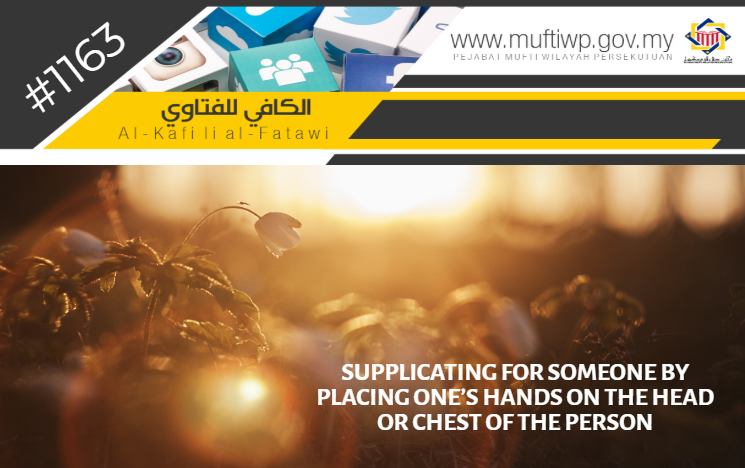
Question:
Assalamualaikum SS Dato’ Seri Mufti. When supplicating for someone, should he place his hands on the head or chest of the person he is supplicating for?
Answer:
Waalaikumussalam wrt. wbt.
Alhamdulillah, praise and thanks to Allah for the countless blessings He has blessed us all with. Blessings and salutations to the Prophet Muhammad PBUH, his wives, his family, companions and all those that follow his teachings to the day of judgement.
Supplication is a type of worship showing that a slave is in need of Allah SWT. (See al-Azkar by al-Nawawi, pg. 395)
Imam al-Khattabi said: “Supplication is a request for help by a slave to his Creator. The reality of supplication is showing one is in need, weak, deprived and depend on Allah SWT where it also shows the honour, glorification and greatness of Allah SWT at the same time acknowledging His honour and blessings.” (See Sya’n al-Dua’, pg. 4)
It also means asking with full hope to Allah SWT to be given goodness from Him, asking humbly, so that the request is granted. (See Jawami' al-Du'a min al-Qur'an wa al-Sunnah by Muhammad Sayyid Tantawi, pg. 5)
We state here that supplication is a form of worship and it is also said to be the essence of worship. This is in accordance with the hadith:
الدُّعَاءُ مُخُّ الْعِبَادَةِ
“The supplication is the essence of worship.”
Sunan al-Tirmizi (3371) and al-Tabarani in al-Mu’jam al-Awsat (3324)
Since supplication is a type of worship, most scholars consider worship is restrained according to the Quran and Sunnah. This is stated by usul scholars:
الأَصْلُ فِي العِبَادَةِ التَّوَقُّف
“The original ruling for acts of worship is restrained (according to the Quran and Sunnah).”
This is the maxim used for most scholars, such as Ibn Hajar in Fath al-Bari. The same is stated in Syarh Zaid Ibn Ruslan, in Syarh al-Zurqani for al-Muwatta', also in al-Adab al-Syar'iyyah by Ibn Muflih and Nail al-Autar by Imam al-Syaukani.
The meaning from the maxim is clear, where it states for anyone who wants to perform any worship should refrain himself until he knows that Allah SWT rule it permissible. This maxim is also used by Imam Ahmad and hadith scholars.
Reviewing on hadiths related to this issue, we found several narrations regarding it. Some of them are:
- Placing hands on the head
This is popular during the supplication in marriage where a husband supplicates while placing his hands on the head of his wife. From Abdullah Ibn Amr R.Anhuma, the Prophet PBUH said:
إِذَا أَفَادَ أَحَدُكُمُ امْرَأَةً ، أَوْ خَادِمًا ، أَوْ دَابَّةً ، فَلْيَأْخُذْ بِنَاصِيَتِهَا ، وَلْيَقُلِ : اللَّهُمَّ إِنِّي أَسْأَلُكَ مِنْ خَيْرِهَا ، وَخَيْرِ مَا جُبِلَتْ عَلَيْهِ ، وَأَعُوذُ بِكَ مِنْ شَرِّهَا ، وَشَرِّ مَا جُبِلَتْ عَلَيْهِ.
“When anyone of you gets a new wife, a servant, or an animal, let him take hold of the forelock and say: Allahumma inni as`aluka min khayriha wa khayri ma jubilat 'alaihi, wa 'audhu bika min sharriha wa sharri ma jubilat `alaih (O Allah, I ask You for the goodness within her and the goodness that she is inclined towards, and I seek refuge with you from the evil to which she is inclined).' ”
Sunan Ibn Majah (1918) and al-Baihaqi in al-Sunan al-Kubra (14211)
This proves that it is permissible to place one’s hands while supplicating for someone.
- Placing the hands on the chest
When the Prophet PBUH perform tawaf around the Ka’ba during Hajjatul Wada’, a man tried to murder the Prophet PBUH, hiding in a corner of the Ka’ba, but the Prophet PBUH noticed him and questioned him. The man felt guilty and answered him remorsefully. Then the Prophet PBUH supplicated for him by placing the Prophet PBUH’s hands on his chest. After that incident, he loves the Prophet PBUH.
The name of the man is Fudhalah bin Umair al-Laithi. His story is recorded in various Sirah and Tarikh books, but the status of this narration is very weak. Among the books that mentioned this narration are al-Sirah al-Nabawiyyah by Ibn Hisyam (5/80), Zad al-Ma'ad (3/361), al-Sirah al-Nabawiyyah by Ibn Kathir (3/584) al-Raudh al-Unf (4/176), al-Iktifa' bima Tadammanahu min Maghazi Rasulillah (2/190) and others.
Hence, in our opinion, it is permissible to place one’s hands on certain places, but the ruling between non-mahram man and woman who are not married should be of consideration.
We close this discussion with a hadith of the Prophet PBUH and his sunnah when visiting a patient or when a patient came to consult him, who are among the Prophet PBUH’s companions. Aisyah R.Anha said:
كَانَ النَّبِيُّ صَلَّى اللَّهُ عَلَيْهِ وَسَلَّمَ يُعَوِّذُ بَعْضَهُمْ يَمْسَحُهُ بِيَمِينِهِ أَذْهِبْ الْبَاسَ رَبَّ النَّاسِ وَاشْفِ أَنْتَ الشَّافِي لَا شِفَاءَ إِلَّا شِفَاؤُكَ شِفَاءً لَا يُغَادِرُ سَقَمًا
The Prophet (ﷺ) used to treat some of his wives by passing his right hand over the place of ailment and used to say, "O Lord of the people! Remove the difficulty and bring about healing as You are the Healer. There is no healing but Your Healing, a healing that will leave no ailment."
Sahih al-Bukhari (5750) and Sahih Muslim (2191)
Al-Hafiz Ibn Hajar cited the opinion Ibn Battal who said, placing hands on a patient trying to comfort and relieve the pain, supplicating for recovery and remedy according to what he knows. And it is possible that the Prophet PBUH used his hands to ruqyah (ask for recovery) on the place affected which leads to it being cured. (See Fath al-Bari, 10/126)
Imam al-Nawawi said: The Prophet PBUH would wipe with his right hand on his companions who complain of an ailment and supplicate with the above supplication. Hence, it is sunnah to wipe with one’s right hand and supplicate for him. (See Sahih Muslim bi Syarh al-Nawawi, 15/351)
We end this discussion with the following supplication:
اللَّهُمَّ اشْفِ مَرْضَانَا وَعَافِ مُبْتَلَانَا وَارْحَمْ مَوْتَانَا
“O Allah! Heal those who are sick among us. Remove the difficulty for those who are tested and bless those who has passed away from among us.”

